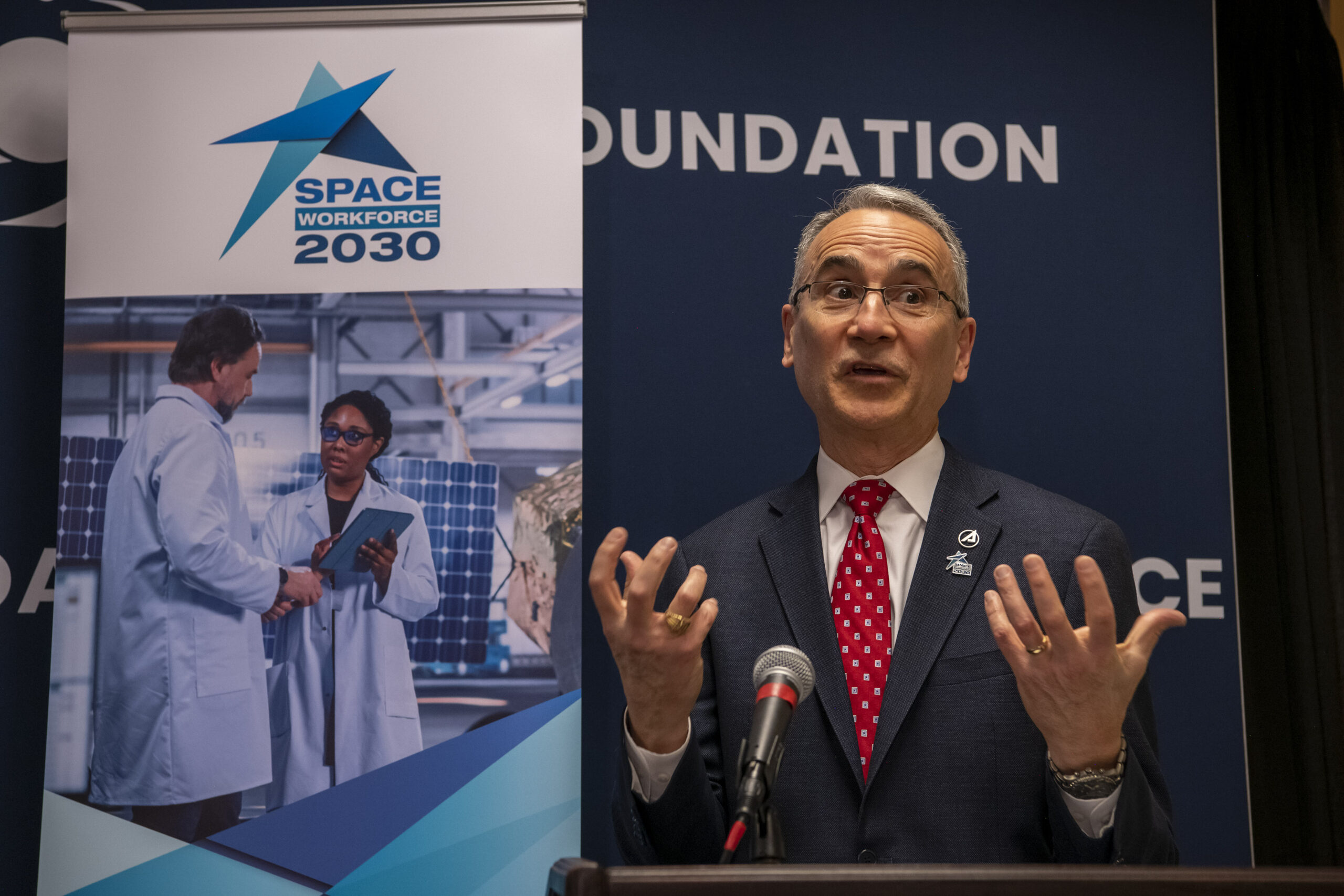One year ago on the space industry’s largest stage – Space Symposium – the leaders of two dozen space companies pledged to support Space Workforce 2030, a new, collaborative effort to advance diversity, equity and inclusion in our industry over the long-term.
This effort was born of the recognition that our success at this pivotal time in space – as we reimagine low Earth orbit, return humans to the moon and expand our horizons further into the universe – depends on our ability to harness the talents and ideas of a diverse, vibrant workforce. And for all our worthwhile individual efforts, we knew that we could accomplish more not on our own, but together – in ways that benefit our entire industry.
Specifically, Space Workforce 2030 (SWF2030) companies pledged to:
1. Boost the number of women and employees from underrepresented groups in the collective technical workforce;
2. Grow the representation of the same groups in senior leadership positions in the collective technical workforce;
3. Increase percentages of women and students from underrepresented groups receiving aerospace engineering degrees to be commensurate with overall engineering programs; and
4. Sponsor K-12 programs to collectively reach over 5 million underrepresented students annually.
The results from the first year of SWF2030 activity are in and we are trending in a positive direction. We are optimistic about our path forward, even as we remain realistic about the challenges we face and the work still to be done to make space more representative of everyone—by and beyond the year 2030.
Perhaps our most important Year 1 measurement was 100 percent transparency. Each of the 30 companies that signed on to the pledge during its first year kept its promise to provide data to track our collective progress and to share best practices for recruitment, retention, representation and STEM outreach. This accountability is fundamental to our effort and will help drive Space Workforce 2030 forward until our goals are met.
SWF2030 companies reported statistically significant increases in six of eight tracked categories, including the percentage of women and people of color in our technical workforces, and increases in the number of people of color in our leadership ranks and intern classes. While more progress is needed across all these measures, the initial data showed additional focus is needed to increase the number of women in senior technical leadership positions and in our intern classes.
Collectively, we also surpassed our annual goal of connecting with more than 5 million students through STEM outreach. We hope to surpass this performance going forward, in part through a new partnership with the Girl Scouts of the USA. With over 2 million Girl Scouts in the United States, we are excited to work with this organization to inspire young women to pursue a career in the space industry.
We have found no shortage of like-minded partners during this first year, starting at the highest levels of our nation’s government. At the second convening of the National Space Council, U.S. Vice President Kamala Harris unveiled space-related STEM initiatives to “Inspire, Prepare and Employ” the next generation of the space workforce. We adopted these three pillars to structure our own work, and Space Workforce 2030 has established working groups to drive activities supporting these national goals.
During her remarks, Vice President Harris also highlighted SWF2030 and one of our early signature initiatives, the National Space Intern Program, which expands the pipeline for diverse talent by offering a single registration portal for internship opportunities at any of our coalition companies. The program provides students with exposure, mentorship and networking opportunities, and we received nearly 1,000 diverse applicants in the program’s first year, an encouraging start as we strive to meet our goal of having 3,000 National Space Interns by the end of this decade.
The challenges our industry faces around diversity did not arise overnight, and we do not expect to solve them in a single year. We know it will take a sustained, industry-wide effort over many years to build a workforce for the future, and we feel strongly that Space Workforce 2030 can be a part of the solution.
When we launched this effort a year ago, we were inspired by the words of President John F. Kennedy and chose to take on this challenge not because it is easy, but because it is hard—and because this challenge is one we are unwilling to postpone. All of us have a role to play in our success. Together, we can ensure that everyone has the opportunity to be a part of our future in space.
On behalf of Space Workforce 2030,
Payam Banazadeh, CEO, Capella Space
Peter Beck, CEO, Rocket Lab
Dave Broadbent, President, Space & C2, Raytheon Technologies,
Tory Bruno, President and CEO, United Launch Alliance
Peter Cannito, CEO, Redwire
Michael Colglazier, CEO, Virgin Galactic
Eileen Drake, CEO, President, Aerojet Rocketdyne
Tim Ellis, Cofounder & CEO, Relativity Space
Rob Geckle, Chairman and CEO, Airbus US Space & Defense
John Gedmark, CEO, Astranis
Janet Grondin, CEO, Stellar Solutions
Steve Isakowitz, President and CEO, The Aerospace Corporation
Dan Jablonsky, CEO, Maxar Technologies
Dave Kaufman, President, Ball Aerospace
Chris Kemp, CEO, Astra
Tim Kopra, CEO, Nanoracks
Laurie Leshin, Director, NASA Jet Propulsion Laboratory
Robert Lightfoot, EVP, Lockheed Martin Space
Brian O’Toole, CEO, Black Sky
Dan Piemont, President, ABL Space Systems
Peter Platzer, CEO, Spire Global
Robbie Schingler, Co-founder & Chief Strategy Officer, Planet Labs PBC
Kay Sears, VPGM SIWS, Boeing
John Serafini, CEO, HawkEye 360
Gwynne Shotwell, President, SpaceX
Bob Smith, CEO, Blue Origin
Melanie Stricklan, Cofounder & CEO, Slingshot Aerospace
Dylan Taylor, Chairman & CEO, Voyager Space
Kelle Wendling, President, Space Systems Sector, L3Harris
Tom Wilson, President, Space Systems, Northrop Grumman
For more information about Space Workforce 2030, to review an annual report detailing the progress made over the pledge’s first full year, or to inquire about joining the pledge, visit www.swf2030.org. For more information about the National Space Intern Program, visit www.NationalSpaceInterns.org.
